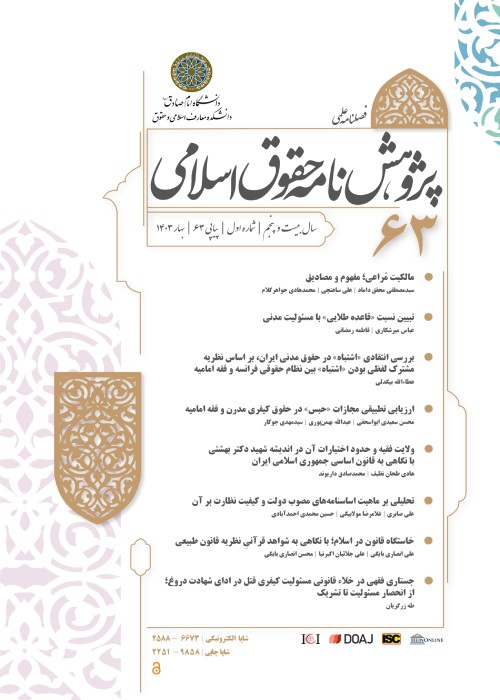The Role of the Leadership in Addressing the Void of Ordinary Law
The foundational stability of any society is significantly anchored in the presence and enforcement of laws. The enactment of laws, a primary responsibility of governance, ensures that societal relationships are regulated based on fairness and justice, thereby securing societal continuity and stability. The constitution of the Islamic Republic of Iran entrusts the Islamic Consultative Assembly with the authority to enact ordinary laws, emphasizing the legislature's monopoly over legislation. This exclusive right entails not only the privilege to legislate but also the duty to do so, ensuring that the legislative needs of society are met. In instances where the legislative body fails to fulfill its mandate, whether due to internal disagreements or conflicts of interest, it raises a pivotal question about the role of leadership, specifically the Guardianship of the Islamic Jurist [Vali-ye Faqih], in addressing legislative voids and guaranteeing citizens' rights to an efficient legislative system. This paper delves into the constitutional frameworks within Iran that enable leadership intervention in legislative processes, aiming to explore the mechanisms through which leadership can address the absence of necessary legislation and its implications on societal stability.
Research Question:
The central inquiry of this study revolves around the role of leadership, particularly the legal personality of the Guardianship of the Islamic Jurist, in filling the void created by legislative inaction within the Islamic Republic of Iran. Specifically, the research seeks to answer: "How can the leadership institution, under the current constitutional framework of the Islamic Republic of Iran, ensure the right of citizens to benefit from an efficient legislative power, particularly in situations where the legislative body fails to enact necessary legislation, leading to a legal vacuum?"
Research Hypothesis:
The hypothesis posited in this research is that the leadership in Iran, especially embodied by the guardianship, possesses the constitutional authority and mechanisms to effectively address and fill legislative voids. This capability is critical in situations where the legislative body is incapacitated by internal disagreements, conflicts of interest, or procedural inefficiencies. The leadership's intervention, as hypothesized, is not only constitutionally sanctioned but is also a necessary mechanism for safeguarding the citizens' right to an efficient legislative system and maintaining societal stability in the face of legislative inaction.
Methodology & Framework, if Applicable:
The research adopts a descriptive-analytical methodology, drawing upon a thorough review of the constitutional law of Iran and extensive library research. This study focuses on elucidating the constitutional basis that mandates the leadership's involvement in legislative processes, particularly analyzing articles 57 and 110 of the constitution of the Islamic Republic of Iran. Through this analytical framework, the research aims to identify the competencies of the leadership in ensuring the enactment of necessary legislation and securing citizens' rights against legislative inefficiencies. The study's approach is distinguished by its emphasis on the "timeliness" of law enactment, prioritizing the prevention of legal vacuums over the qualitative aspects of the legislation. This methodology facilitates a comprehensive understanding of the leadership's role in crisis resolution and the establishment of a legal mechanism to address legislative voids.
The analysis reveals that the leadership within the Islamic Republic of Iran plays a pivotal role in addressing legislative inefficiencies and ensuring the citizens' right to an effective legislative system. The study highlights that the constitution grants the Guardian Jurist, significant powers to intervene when the legislative assembly fails to meet the legislative needs of society. These powers are rooted in various constitutional provisions, notably Paragraphs 1, 2, 3, 7, and 8 of Article 110, which collectively empower the leadership to supervise the proper execution of policies, issue referenda decrees, resolve disputes between powers, and address systemic problems. This constitutional framework enables the leadership to act decisively in instances of legislative deadlock or legal vacuum, thereby preventing harm to society and ensuring the continuity of governance.
The research underscores the leadership's authority to issue state decrees [Hokm-e Hukoomati] as an exceptional measure to fill legislative voids. These decrees, while potentially lacking in the quality and technicality of laws enacted through the ordinary legislative process, serve as a necessary intervention to address immediate legislative needs and safeguard public interests.
The study concludes that the leadership in the Islamic Republic of Iran, by virtue of its constitutional mandate, possesses the necessary competencies to address legislative inefficiencies and ensure the protection of citizens' rights to an efficient legislative system. The constitution provides a robust framework for leadership intervention in cases where the legislative assembly fails to fulfill its legislative duties, offering various mechanisms for resolving legal vacuums and preventing societal harm. The leadership's role, as defined by the Constitution, is essential in maintaining the stability and continuity of the legal system, particularly in ensuring that the legislative needs of society are met in a timely and effective manner.
The unique competencies granted to the leadership, including the authority to issue state decrees [Hokm-e Hukoomati] and direct legislative action, highlight the Iranian legal system's innovative approach to safeguarding public rights and addressing legislative voids. This extraordinary framework ensures that the risk of infringing citizens' fundamental rights due to legislative inefficiency is minimized. The leadership institution, with its comprehensive constitutional powers, emerges as a critical mechanism for guaranteeing public rights and facilitating effective governance, thereby affirming its unique position within the Iranian legal and constitutional order.
- حق عضویت دریافتی صرف حمایت از نشریات عضو و نگهداری، تکمیل و توسعه مگیران میشود.
- پرداخت حق اشتراک و دانلود مقالات اجازه بازنشر آن در سایر رسانههای چاپی و دیجیتال را به کاربر نمیدهد.


